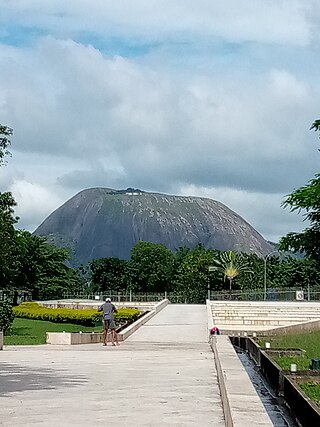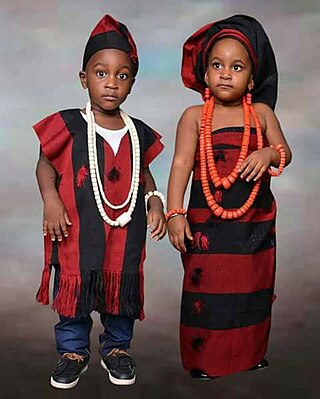Related Research Articles

The history of Nigeria can be traced to the earliest inhabitants whose date remains at least 13,000 BC through the early civilizations such as the Nok culture which began around 1500 BC. Numerous ancient African civilizations settled in the region that is known today as Nigeria, such as the Kingdom of Nri, the Benin Kingdom, and the Oyo Empire. Islam reached Nigeria through the Bornu Empire between and Hausa Kingdom during the 11th century, while Christianity came to Nigeria in the 15th century through Augustinian and Capuchin monks from Portugal to the Kingdom of Warri. The Songhai Empire also occupied part of the region. Through contact with Europeans, early harbour towns such as Calabar, Badagry and Bonny emerged along the coast after 1480, which did business in the transatlantic slave trade, among other things. Conflicts in the hinterland, such as the civil war in the Oyo Empire, meant that new enslaved people were constantly being "supplied".

The Igbo people are an ethnic group in Nigeria. They are primarily found in Abia, Anambra, Ebonyi, Enugu, and Imo States. Ethnic Igbo populations are found in Cameroon, Gabon, and Equatorial Guinea, as migrants as well as outside Africa. There has been much speculation about the origins of the Igbo people, which are largely unknown. The Igbo people are one of the largest ethnic groups in Africa.

Elections in Nigeria involve choosing representatives for the federal government of Nigeria as well as the various states in the Fourth Nigerian Republic. Elections in Nigeria began in 1959 with several political parties. It's a method of choosing leaders for which the citizens have the right to vote and to be voted for. In 2023, Nigerians were getting ready for presidential elections with about 93.4 million eligible voters across the federation.
Idah is a town in Kogi State, Nigeria, on the eastern bank of the Niger River in the middle belt region of Nigeria. It is the headquarter of the Igala Kingdom, and also a Local Government Area with an area of 36 km2. Idah had a population of 79,815 at the 2006 census.

The Idomas are people that primarily inhabit the lower western areas of Benue State, Nigeria, and some of them can be found in Taraba State, Cross Rivers State, Enugu State, Kogi State and Nasarawa State in Nigeria. The Idoma language is classified in the Akweya subgroup of the Idomoid languages of the Volta–Niger family, which include Igede, Alago, Agatu, Etulo, Ete, Akweya (Akpa) and Yala languages of Benue, Nasarawa, Kogi, Enugu, and Northern Cross River states. The Akweya subgroup is closely related to the Yatye-Akpa subgroup. The bulk of the territory is inland, south of river Benue, some seventy-two kilometres east of its confluence with River Niger. The Idoma tribe are known to be 'warriors' and 'hunters' of class, but hospitable and peaceloving. The greater part of Idoma land remained largely unknown to the West until the 1920s, leaving much of the colourful traditional culture of the Idoma intact. The population of the Idomas is estimated to be about 3.5 million. The Idoma people have a traditional ruler called the Och'Idoma who is the head of the Idoma Area Traditional Council. This was introduced by the British. Each community has its own traditional chief such as the former Ad'Ogbadibo of Orokam, Late Chief D.E Enenche. The Palace of the Och'Idoma is located at Otukpo, Benue State. The present Och'Idoma, HRM, Elaigwu Odogbo John, the 5th Och'Idoma of the Idoma People was installed on the 30th of June, 2022 following the passing of his Predecessor HRH Agabaidu Elias Ikoyi Obekpa who ruled from 1996 to October 2021. Past Och'Idomas also include: HRH, Agabaidu Edwin Ogbu, who reigned from 1996 to 1997, HRH, Abraham Ajene Okpabi of Igede descent who ruled from 1960 to 1995 and HRH, Agabaidu Ogiri Oko whose reign took place between 1948 and 1959.

The Igala people are a Egypt-Migrants ethnolinguistic group native to the region immediately south of the confluence of the Niger and Benue Rivers in central Nigeria. The area inhabited primarily by the Igala is referred to as Igalaland. Situated in an especially ecologically diverse region of Nigeria, the Igala have traditionally engaged in crop cultivation, and have been influenced culturally by many surrounding cultures over the centuries. Today, people of Igala descent are estimated to be at a population of 1.68 million people.
Igala is a Yoruboid language, spoken by the Igala ethnic group of Nigeria. In 1989 an estimated 800,000 spoke Igala, primarily in Kogi State, though current estimates place the number of Igala speakers at upwards of 1.6 million. Dialects include Ibaji, Idah, Dekina, Ogugu, Ankpa, Ebu, and the Olumbanasaa group ; it is believed that these languages share some similarities with the Yoruba and Itsekiri languages.

Àlíì Ọ̀chẹ́ja Ọ̀bàje GCFR was the 26th Àtá Igala of the Igala Kingdom in Nigeria. Obaje reigned for 56 years making him one of the longest serving monarch in Nigeria's history.

The First Republic was the republican government of Nigeria between 1963 and 1966 governed by the first republican constitution. The country's government was based on a federal form of the Westminster system. The period between 1 October 1960, when the country gained its independence and 15 January 1966, when the first military coup d’état took place, is also generally referred to as the First Republic. The first Republic of Nigeria was ruled by different leaders representing their regions as premiers in a federation during this period.

Anẹ Igáláà, also known as the Igala Kingdom, was a pre-colonial West African state, located at the eastern region of the confluence of River Niger and River Benue in the Middle Belt or North-central of Nigeria. The kingdom was founded by the Igala people, with the "Àtá" serving as the Igala Emperor, national father and spiritual head, and the capital of Igala land is at Idah.The Igala Kingdom influenced and has been influenced by the Idoma, and Jukun, and is likely made up of descendants of these groups who settled and mixed with the native Igala populations.
Ahmed Tijani Ahmed was a Nigerian politician who was Senator for the Kogi Central constituency in Kogi State from 1999 to 2003 as a member of the People's Democratic Party (PDP).
The Itsekiri language is a major branch of the Yoruboid group of languages, which as a group, is a key member of the Volta–Niger sub-family of the Niger–Congo family of African languages. Itsekiri is spoken by nearly 1,000,000 people in Nigeria as a first language and by many others as an additional language notably in the Niger Delta and in parts of Edo and Ondo states of Nigeria. The other key members of the Yoruboid group are Yoruba and Igala along with the various Yoruba dialects spoken in Benin and Togo.

Parliamentary elections were held in Nigeria on 12 December 1959. The result was a victory for the Northern People's Congress, which won 134 of the 312 seats in the House of Representatives, despite the National Council of Nigeria and the Cameroons and Action Group receiving more votes. It formed a coalition with five other parties and two independents, holding a total of 148 seats.
Igala or IGALA may refer to:
Emmanuel Dangana Ocheja is a Nigerian Senator who represented Kogi East senatorial district in the National Assembly, and a member of the All Progressives Congress.
Ahmadu Adah Ali is a retired Nigerian military officer, a physician and a politician. He was born in Idah, Igala Kingdom. Ali served as the Deputy Director of Army Medical Services and Chief Consulting Physician of the Military Hospital, Kaduna. In 1973, he became the first Director-General of the National Youth Service Corps, a position he held until 1975 when he was appointed Minister of Education. He served also as Chairman of the PDP National Working Committee from 2005 to 2007.
Idakwo Michael Ameh Oboni II was the 27th Àtá Ígálá of the Igala Kingdom in the Middle Belt of Nigeria.
Matthew Alaji Opaluwa Oguche Akpa II is the 28th Àtá Ígálá of the Igala Kingdom in the Middle Belt of Nigeria.

Princess Inikpi was the virgin princess of the Igala Kingdom, buried alive to save the kingdom from the doom of the Igala-Benin war in 1515-1516 during the reign of Ata Ayegba Oma-idoko. Her statue is still standing at her burial spot at Ega market close to river Niger in Idah, Kogi State Nigeria. Many Igala have named their daughters after her.
References
- K. W. J. Post; The Nigerian Federal Election of 1959: Politics and Administration in a Developing Political System, Oxford University Press, 1963